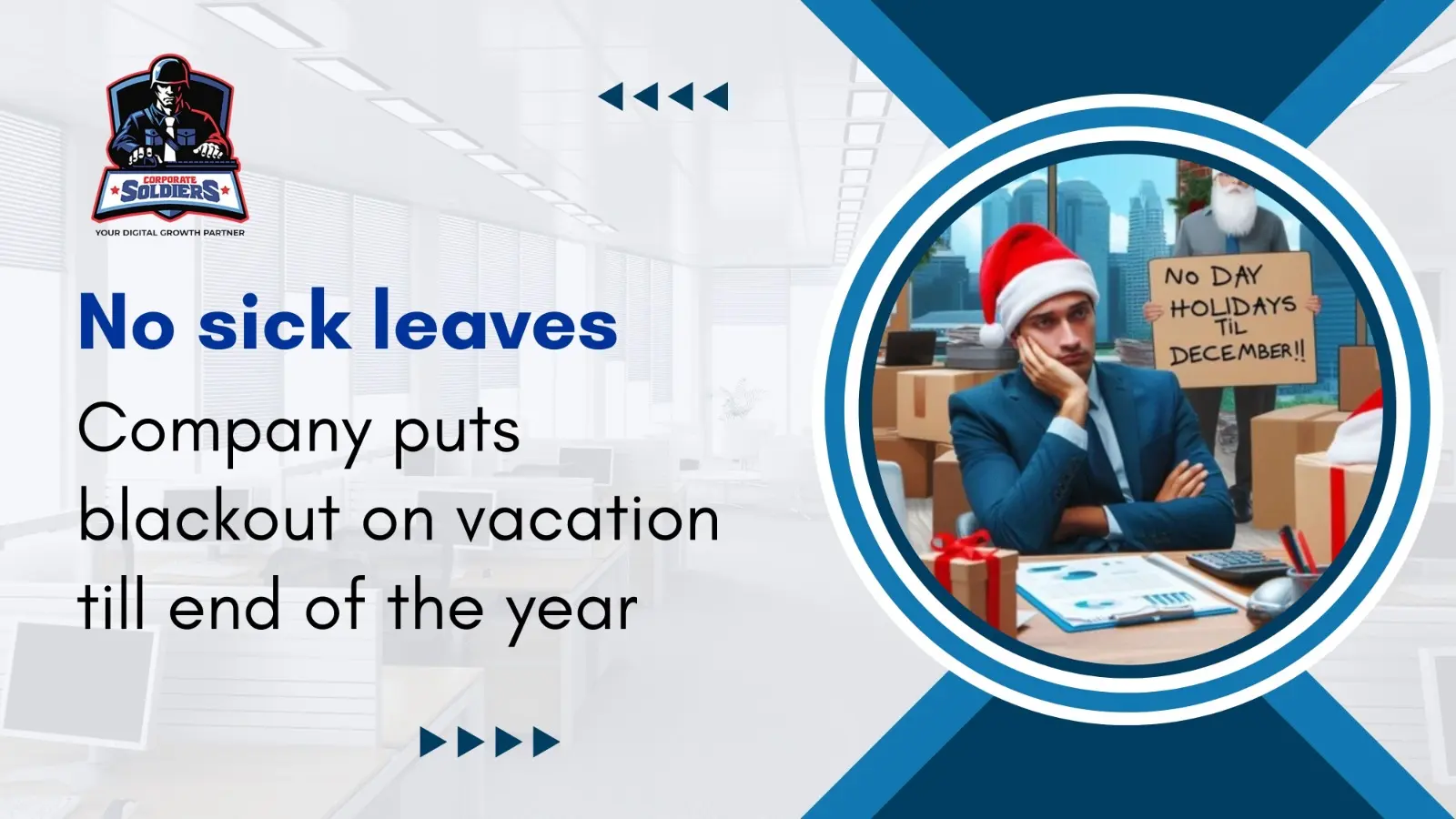A recent company announcement imposing a blackout on vacation and sick leave from November 25 to December 31 has led to extensive outrage on social media. This policy, which prevents employees from taking any time off during a traditionally busy season, highlights significant concerns regarding employee welfare, rights within the workplace, and the overall corporate culture.
The Policy Announcement
A Reddit post that went viral discussed a company’s decision to implement a blackout on vacation days, which prohibits employees from taking sick leave until the conclusion of the year. The employer explained this strict measure by emphasising the need for “all hands on deck” during an expectedly hectic season.
The notice stated, “From November 25 to December 31, there will be a blackout on vacation days and time off, with no exceptions for sick leave. Given that these are our busiest days of the year, we will need all staff present. Thank you.”
Social Media Backlash
Reddit users have expressed their dissatisfaction with this employer’s approach to managing excessive workloads. While some participants offered humorous remarks, such as, “Christmas is for everyone, but employees,” and “Corporate will be visited by three ghosts this Christmas,” others seized the moment to voice their concerns regarding the evolving culture within the corporate sector.
One user remarked, “It is quite common not to provide holidays during Christmas. However, prohibiting sick days crosses a line. In numerous countries, such a policy is illegal.”
Another user contributed to the discussion by stating, “If everyone shared your perspective, there would be no services available during the Christmas period. There would be no nurses to assist you, surgeons would not attend to critical surgeries, and there would be insufficient firefighters available to protect your home from a fire.”
Personal Stories Highlighting Employee Struggles
In response to the announcement, many individuals recounted personal experiences that echo the frustrations shared by a significant number of employees.
One participant shared a story about a business owner who similarly limited time off during peak periods, which resulted in high turnover rates stemming from overwork and insufficient care for staff.
This account emphasises a disturbing trend in some workplaces where the pressures of business overshadow the essential rights of employees.
Read more: Lessons Learned from Successful Entrepreneurs: Insights for Aspiring Business Owners
Potential Consequences for Companies
The introduction of a no-sick-leave policy may adversely impact both employee health and overall productivity within organisations.
Evidence suggests that when workers are obligated to remain on the job while ill—commonly termed “presenteeism”—it can result in reduced efficiency and an increased risk of illness spreading throughout the workplace.
Additionally, such policies could lead to increased employee turnover as individuals pursue more accommodating workplaces.
The Significance of Workplace Culture
This situation talks about the importance of workplace culture in determining employee satisfaction and retention.
Companies that promote a supportive and trusting environment typically enjoy a more engaged workforce, with employees willing to work extra during busy times.
On the other hand, organisations that adopt rigid policies without taking employee welfare into account may experience dissatisfaction from their current workforce and may also struggle to attract new talent who seek a positive workplace culture.
Alternative Approaches
Organisations might consider alternative approaches to managing peak workloads that consider employee needs rather than implementing rigid leave policies.
- Flexible Work Arrangements: Companies can allow their employees to modify their schedules and can support personal requirements while ensuring overall productivity.
- Temporary Staffing Solutions: Companies should engage temporary personnel during high-demand periods to reduce the burden on current employees.
- Incentive Programs: Companies can also offer bonuses or additional time off following busy intervals that will help to encourage employees and recognize their efforts.
Summing up
The criticism surrounding the no-sick-leave policy illustrates deeper issues within corporate culture concerning employee rights and treatment. As businesses face high-demand periods, it is important for them to balance operational requirements with a genuine concern for their employees.
By adopting a culture that emphasises both employee welfare and productivity, organisations can promote loyalty and boost overall effectiveness. This recent backlash serves as a reminder that respecting employees is not merely a matter of ethics; it is also a strategic business practice.










